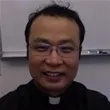Relevance of Religion
Religion and Spirituality On Campus

Rev. Jaehwa J. Lee
Bryn Mawr College- 104 Aelwyd on Cambrian Row
Fatherjaehwa@me.com
Haverford College - 208 Whitehead Campus Center
Fatherjaehwa@me.com
Swarthmore College - Bond Hall - 20
jlee3@swarthmore.edu
Swarthmore, Bryn Mawr and Haverford campuses have each elected to highlight a phenomenon revealed in numerous recent surveys: although their parents and grandparents may have 'dropped out' of religious practice, as part of the counter-culture movement of the 60's thru the 80's, today's collegians have rediscovered and are acting upon the conclusion that spirituality and faith are a surprisingly important factor in their lives. The place of faith and spirituality in campus life is, if for only week, at center stage.
Something of the older mentality stands a bit bewildered by it all. Faculty and administrators long used to being secular to the point of atheism are sensing the need either to 'restate the case' for the separation of things of faith and things academic or affirm, themselves, that they have long seen the relationship and have even lived by it....quietly. In the first camp, Richard Dawkins has -- had -- seized the stage momentarily with 'The God Delusion.' Smaller, echoing voices are emboldened to add their grace notes to his melody. One such is Lawrence Krauss, professor of physics and astronomy at Case Western Reserve, visiting at Vanderbilt. In the January 12 back page of the Chronicle Review he stands in disbelief of the stupidity of Benedict XVI for professing to approach the understanding of God through the use of reason. He almost breathes a sigh of relief that Harvard's Task Force on General Education backed away from a revision of their general-education requirements for undergraduates that would have include exploration of the relationship between reason and faith. But they did flirt with the idea.
Krauss is appalled at even the possibility of such an approach because he is firm fixed in his understanding of faith as 'fundamentally irrational' because it requires the acceptance of the existence of something for which there is no objective evidence.
Professor Krauss is not at all comfortable with the result of what he terms 'extremist religious indoctrination' given to children not yet capable of 'sophisticated analytical-reasoning skills' -- this by churches, synagogues and mosques alike. He calls it.. naturally...brainwashing, and disparages parents who would do such unwise, if well-meaning, harm to their offspring. One wonders if the good professor has children, has ever watched as they blithely skip away from all that childhood 'brainwashing' to discover...or not...on their own, the truth of what Mom and Dad stuffed into their little heads.
His dukes are up for what he sees as a seriously mounted attack on science by religion, citing especially the Catholic Church's ability, at one and the same time, to see no contradiction between its acceptance of the 'historical facts associated with the evolution of life' and its 'insistence that the facts are consistent with a divine plan and free will.' He is angered that the pope should 'equate theology and faith by demanding that deeply religious individuals base their faith on rationality.' Inappropriate! Illogical! He goes even further to connect such irrationality with mental illness: "One definition of sanity is accepting the reality of the world around us as evidenced by our senses." What's the problem, Larry? Pure reason has done that before and wound up with egg on it's face. Copernicus and those who embraced his theory, stood firm on the message read in the heavens: the sun is the center of a universe that, logically, can have had no beginning....until, of course bigger and better telescopes came into play...until, of course, the big bang became the still operative theory of beginnings.
Dr. Krauss concludes that 'reason must be unfettered by faith.' Certainly a concise and succinct statement of the case. But... what if!
Since non-believing science charges, rightly, that believers cannot prove, by reason alone, the existence of God, they must also accept the reverse, that, given the complexities behind the universe in both its macrocosmic and microcosmic dimensions, science cannot eliminate the possibility -- if not probability - of what Aquinas called the First Cause.
Our own John Henry Newman, in his defining opus, The Idea of a University:
"If, then, in an Institution which professes all knowledge, nothing is professed, nothing is taught about the Supreme Being, it is fair to infer that every individual in the number of those who advocate that Institution, supposing him consistent, distinctly holds that nothing is known for certain about the Supreme Being; nothing such, as to have any claim to be regarded as a material addition to the stock of general knowledge existing in the world. If on the other hand it turns out that something considerable is known about the Supreme Being, whether from Reason or Revelation, then the Institution in question professes every science, and yet leaves out the foremost of them. In a word, strong as may appear the assertion, I do not see how I can avoid making it, and bear with me, Gentlemen, while I do so, viz., such an Institution cannot be what it professes, if there be a God. I do not wish to declaim; but, by the very force of the terms, it is very plain, that a Divine Being and a University so circumstanced cannot co-exist."
If there is a God, he had better be found in the course catalogue. If there is no God, that catalogue had better be prepared to provide courses that explain the universe better that Pure Chance 101.



